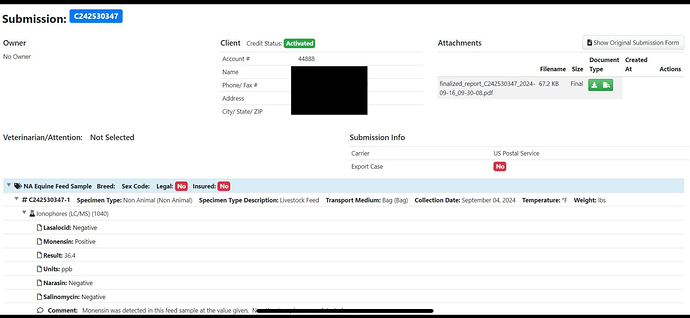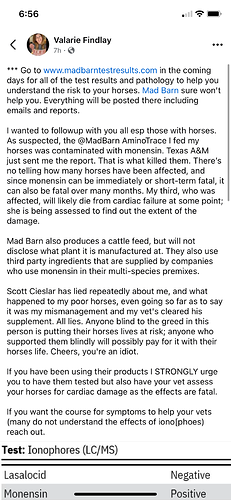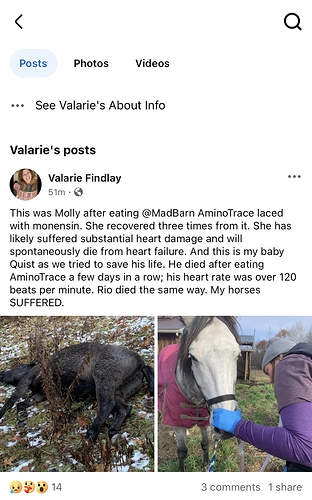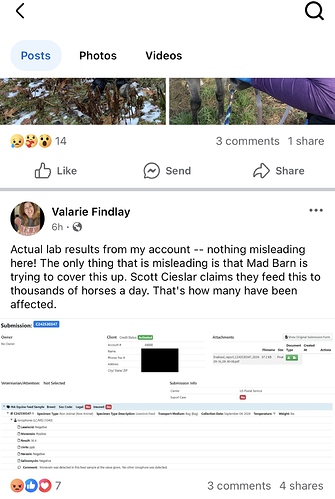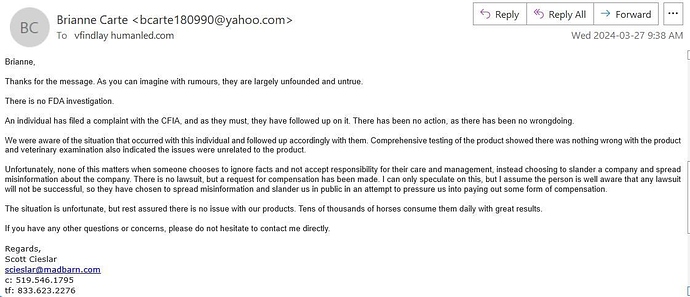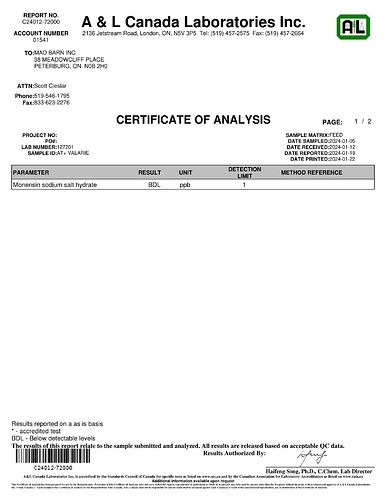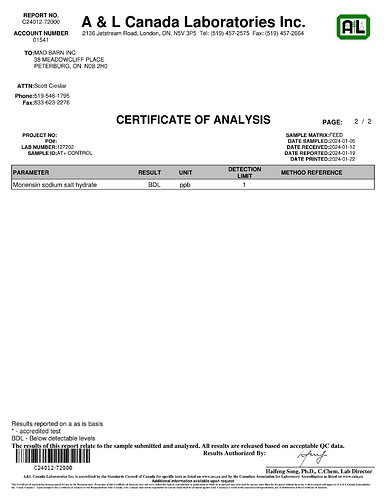Thoughts on this? I can’t find evidence that Mad Barn produces cattle feed but I am concerned. I have already emailed my vet to ask her opinion on the situation.
If you feed anything from them, I would discontinue until there’s more information.
I think monensin should be banned period. If it’s that toxic why, why, is it still allowed on the market?
This story does not add up. Hypothetically, if there were contamination with Monensin, this would not be an incident isolated to one farm. Thousands of horses get Amino Trace (and other Mad Barn products) daily. If there were true contamination, there would be numerous cases. This incident also occurred around 11 months ago.
Mad Barn products are manufactured in an equine-only facility in Canada and doesn’t have any Monensin-containing products manufactured there.
From what it seems, this woman is very distraught about the death of her horses, and understandably so. I hope she is able to get the closure she needs and stops this before legal action is pursued against her for defamation.
As an equine nutritionist, I would not be concerned with your Mad Barn products.
I have fed mad barn for 8 or 9 yrs. I wasn’t aware that they had a dairy portion of the business. I will be watching the site to see, we feed omneity, 3 in 1 and magnesium from there.
Posting the CFAI needs longer for an ATI doesn’t necessary mean that there is investigations either, there could be various reasons. ATI takes time regardless, and it’s great if they do it right.
I also questioned if you are sharing your own screen shot, why blank out your name (address I get), and it doesn’t actually state what is being tested. Just more questions then answers at this point. Hopefully madbarn will make a statement since this is taking off like wildfire.
There are lots of things in daily life that work great for a certain species but are very toxic to another. Why would we get rid of all those things?
The horses died before 3/27/24 and the feed was tested 9/4/24? Doesn’t quite add up.
Would this show up in the bloodstream of the horses, if immediately tested?
I’m guessing by the time symptoms show up a blood test wouldn’t show the metabolites. Monensin poisoning is notoriously hard to prove. Why wouldn’t you test the feed immediately?
Wow! 

Is this enough monesin to cause these issues? Obviously we all know that it’s toxic to equines, but is 36.4 parts per billion in a couple ounces fed daily for a few days enough to kill a horse?
I remember a monesin concern several years ago with…Nutrena, maybe? where one test did show a very small amount of monesin, but it wasn’t considered enough to harm, and another test showed none.
eta: 36.4 ppb = 0.0364 mg per kg, or 0.000364 mg per gram.
Amino Trace+ (is that the right product?) is fed at 200g/day, so that’s 0.0728 mg of monesin.
This paper
https://www.sciencedirect.com/science/article/abs/pii/S0737080696800591
says
“Single dose studies by gavage with mycelial monensin resulted in an estimated LD50 of 1.38 mg/kg of body weight.”
So that’s 750 mg per 1200# horse resulted in half of them dying, or over 10,000 times what’s reported here.
Obviously any monesin is bad, and especially shouldn’t be there in a product that’s supposed to be produced in a monesin free facility, but this amount doesn’t seem to be enough to kill a horse?
BUT, are their shipping practices of raw products into their plant stringent enough to ensure no ionophores can enter their plant and their products? We know that other companies have had (and cleaned up!) issues that were due to raw ingredient contamination.
I am still using some MB products that I haven’t found better sources for, but I was turned off a few months ago when I had 2 out of 2 horses suddenly and absolutely 100% refuse to eat their feed when I started a new container of Omneity after they’d been eating it for years and months respectively. IMO, a filler-free product shouldn’t fluctuate that much to turn horses off it.
I now only use single ingredient products from MB because, in theory, they are only packaging them, and there should be very, very limited possibility of contamination since they are weird products (not typically used in feed for any other animal) and not likely to be shipped by companies that may also ship products that may be contaminated by ionophores. In theory.
An acquaintance of mine shared these posts this morning. I facebook creeped the woman, she seems like someone who has a kneejerk reaction to everything, maybe a little off the rails.
I’m incredibly skeptical of her claims. I’ve been feeding a variety of MadBarn Canada products for several years with no issue.
It seems very unlikely that only her bag of AminoTrace was affected. I haven’t heard any unusual deaths or cardiac issues over the spring/summer in Ontario.
Just posted by MadBarn on their FB page:
Horses are at the heart of everything we do at Mad Barn. Their well-being always comes first for our team of 4 veterinarians, 7 PhD scientists and other devoted horse lovers who dedicate their lives to making this world a better place for all equines.
Our equine products are made in Canada in medication-free facilities that are FDA and CFIA inspected, and adhere to the highest quality standards in feed and supplement manufacturing. We conduct comprehensive testing on all incoming ingredients and finished products to ensure they are safe, free of contamination, and effective for the thousands of horses that feed Mad Barn every day. We also implement robust ongoing Quality Assurance and Control processes led by industry experts, ensuring we consistently deliver on our Customer Happiness Guarantee.
In December, a customer reported the unfortunate euthanization of two of her horses to us. A thorough investigation was conducted by independent veterinarians, pathologists, and the CFIA. There was no evidence of a connection between our products and the symptoms experienced by these horses. There were also no indications of Monensin toxicosis reported on the autopsy or veterinary findings.
In January, we also conducted thorough laboratory testing of the products batch received by the customer for any potential contaminants, which included Monensin. The lab report confirmed that there were no issues with the product, and no trace of Monensin was detected.
The false statements made by this individual are inaccurate and harmful. We maintain committed to serving our customers with trustworthy, high-quality equine products and working hard every day to make the world a better place for all equines.
That’s why we use the highest quality ingredients, make significant research contributions, build free tools for all horse owners, provide free nutritionist services and develop industry-leading educational resources through Mad Barn Academy. We take the trust of our customers seriously because we know how much each of you care about doing the best for your horses.
It sounds like Mad Barn did test the feed samples they were provided by this person and they were negative for contaminants including monensin, and then this lady refused to accept the answer so she had her own testing done later on (if I’m following correctly).
It seems to be that earlier results would be more likely to be correct as the more the product is handled, moved around, stored, etc it would have more chance of being contaminated.
I had the exact same thing happen at about the same point with a bag (actually, two) of… Amino Trace. I’m still feeding Copper/Zinc and one of the herbs but I’m increasingly nervous.
It depends on which company tested. Some are only able to test for a few ionophores, and/or at a higher level, and some are more sensitive and can pick up lower levels of contamination and/or more ionophores
Can you explain more? Did you have sick (or dead  ) horses?
) horses?
The post they were responding to was about horses suddenly not being willing to eat their supplements that they have been on for a length of time with out no issue.
Years ago, I worked for a major farm cooperative. I clearly remember our division manager of livestock feeds recommending never to feed my horses anything that came from a facility that handled ionophore. He said anyone can make a mistake.
ohhh, I missed that it was a reply, thanks! I really dislike that part about this (not so new anymore) format.

